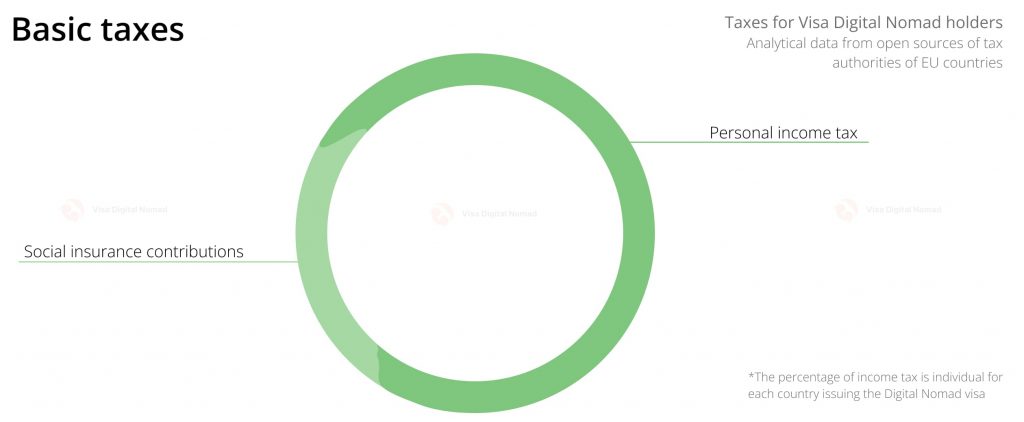“Digital nomads” are entrepreneurs who work remotely outside their home country. They often change geographical locations, choosing the most convenient and economically beneficial places for freelancing and launching startups. Since remote workers can earn income in one country while being territorially located in another, the issue regarding the specifics of taxing digital nomads remains relevant. Let’s delve into it further.
What types of taxes are provided for freelancers
Digital nomads not only organize their professional activities independently but also contribute to the budget of the country that issued the nomad visa. The main expense item for the self-employed is personal income tax (PIT).
Additionally, entrepreneurs working remotely contribute to social insurance (if there is no agreement on mutual offsets for insurance between the country where the freelancer is a resident and the state that issued the Digital Nomad visa).
For entrepreneurs planning to implement startups, value-added tax (VAT) is also provided. This type of tax is levied on the sale of goods or services.
Where should a freelancer pay taxes: general rule
The legislation of most countries in the world provides for the territorial principle of taxation. It obliges remote workers to make fiscal contributions in the country where they are actually residing. In the digital nomad community, there is a belief that if you travel regularly and do not stay in one country for more than 183 days, then the freelancer bears no tax burden. However, such behavior tactics can lead to both administrative and criminal liability. Even if the nomad visa holder timely fulfills obligations to pay fees and charges aimed at replenishing the treasury, they may face the issue of double taxation.
Despite the fact that Russia has concluded more than 80 agreements that eliminate the principle of double taxation, some of them are currently suspended due to the deterioration of the international situation and the introduction of new sanctions. Russia has suspended agreements with 38 unfriendly states (such as the Czech Republic, Poland, Canada, the USA, the Netherlands, Denmark, Latvia, and others).
To rid oneself of the taxpayer status of the country whose citizen is a digital nomad, it is not enough to move to the state that issued the digital nomad visa. It is necessary to inform the tax authority about the change of residence. Only after receiving a document confirming deregistration from the tax office in the home country, the freelancer can avoid the recovery of additional fees and charges.
Income tax rates in different countries
In order to increase competitiveness, some countries do not impose income tax on remote workers. For example, a zero income tax rate is in effect in the UAE, Bermuda, Barbados, Argentina, Antigua and Barbuda, and Cape Verde. However, it is necessary to remember the principle of double taxation. In particular, there is an official agreement between Russia and the UAE on the absence of double taxation, but it does not apply to the entrepreneurial activities of nomads. If a digital nomad works remotely while being employed by a domestic company, they will pay PIT (from 13 to 15%) into the Russian budget until they change their tax resident status, which mainly occurs after permanent residence in a foreign country for at least 6 months.
In many EU countries, a progressive scale of taxation is provided for digital nomads. The amount of PIT depends directly on the amount of income received during the reporting period (year). European authorities may also provide tax payment benefits (for example, during a certain period, a digital nomad is exempt from the obligation to transfer PIT to the budget).
Let’s look at the income tax rates in some European countries.
Spain
The tax resident status of a nomad is acquired after permanent residence in the Kingdom for at least 183 days. The Spanish authorities have introduced the following income tax rates for digital nomads:
- 19% (annual income – less than 12,449 euros);
- 24% (annual income – from 12,450 to 20,199 euros);
- 30% (annual income – from 20,200 to 35,199 euros);
- 37% (annual income – from 35,200 to 59,999 euros);
- 45% (annual income – from 60,000 to 299,999 euros);
- 47% (annual income – over 300,000 euros).
Freelancers can optimize the amount of contributions to the Kingdom’s budget by using amendments to national legislation (the Beckham Law). This regime sets unified rates at 24% and 47% PIT (for annual income up to 600,000 and over 600,000 euros, respectively).
An entrepreneur in the status of a self-employed person pays VAT provided that their client is registered in a country that is a member of the EU. The amount of contributions to social insurance ranges from 225 to 530 euros (depending on the amount of profit, the specifics of entrepreneurial activity, and the age of the digital nomad).
Summary table of taxes
| Tax name | The amount of tax | Note |
| IRNR (Non-resident Income Tax) | 24% | Base rate for non-residents from countries outside the EU |
| IRNR for EU citizens | 19% | Applies to non-residents from EU countries |
| IRPF (Income Tax) for residents | 19-47% | Progressive scale depending on income |
| Beckham’s Law tax (for digital nomads) | 24% | Fixed rate on income up to €600,000 for the first 5 years; excess is subject to a rate of up to 47% |
| Tax for digital nomads on a new visa | 15% | Reduced rate for the first 4-5 years of stay |
| IRPF for autonomo (freelancers) – total rate | 15% | The standard retention rate for most self-employed people |
| IRPF for beginners autonomo | 7% | It is applied during the first three years of activity |
| IRPF for specific professional activities | 7% | Defined by the Income Tax Act |
| VAT (IVA) | 21% | The standard VAT rate that car owners must include in their invoices |
Hungary
The obligation to pay income tax for the holder of the White Card arises after 6 months of permanent residence in the Hungarian state. Digital nomads pay PIT at a rate of 15%. Options for tax regimes and the amount of contributions to the social fund are described here.
Main tax regimes and rates
| Tax name | The amount of tax | Note |
| Income Tax (SZJA) | 15% | Fixed rate for resident individuals |
| Social contributions (TB) | 18,5% + 13% | Mandatory payments: 18.5% – employee, 13% – employer |
| Átalányadózás (fixed) | 40-93% of expenses | Simplified mode: 60% of income is taxed 46.5% (15%+18.5%+13%) |
| KATA (simplified mode) | 50,000 HUF/month | Available for annual income of less than 18 million HUF, limited for legal entities from 2022 |
| Tax on dividends | 15% | For residents, subject to double taxation agreements |
| Municipal tax | Up to 2% of revenue | Charged by local authorities (for example, 2% in Budapest) |
| VAT (ALFA) | 27% (standard) | Required with an annual turnover of more than 12 million HUF |
Greece
The Greek authorities have also provided for a progressive scale of taxation for foreign guests working remotely. Greek legislation introduces the following PIT rates:
- 9% (annual income – less than 10,000 euros);
- 22% (annual income – from 10,001 to 20,000 euros);
- 28% (annual income – from 20,001 to 30,000 euros);
- 36% (annual income – from 30,001 to 40,000 euros);
- 44% (annual income – over 40,000 euros).
Self-employed individuals can take advantage of a special tax regime that allows them to reduce their personal income tax (PIT) base by 50% for up to 7 years while staying in Greece.
Expenses for social insurance for freelancers amount to 15.75% of earnings.
The VAT rate for startups is set at 24% (for certain categories of goods and services, such as elderly care, it is 13%).
Table of income taxes and related payments
| Tax name | The amount of tax | Note |
| Income tax (residents) | 9-44% | Progressive scale. For new residents, there is a 50% discount on income from Greek sources for the first 7 years |
| Income tax (non-residents) | 9-44% | Is charged only on income earned in Greece |
| Social Contributions (EFKA) | 13,33-16% | Mandatory payments: 13.33% (pension) + 2.67% (medical). Calculated from the declared income |
| Imputed tax | Formula calculation | Calculated based on expenses (housing, transportation, equipment). May exceed the actual income |
| VAT (ΦΠΑ) | 24% (standard) | Required for annual turnover of more than 10,000€. Preferential rates of 6% (medicines) and 13% (groceries) |
| Luxury tax | 10% | It is applied to jewelry, fur clothing and luxury items |
| Special mode for IT specialists | 22% | Fixed rate for income from IT contracts |
Italy
Freelancers working remotely on the territory of the Italian Peninsula pay taxes to the Italian budget on general grounds. The amount of fiscal payments depends on the annual income. The tax system of the country provides for the following progressive scale:
- 23% (annual income – less than 28,000 euros);
- 35% (annual income – from 28,001 to 50,000 euros);
- 43% (annual income – over 50,000 euros).
Self-employed individuals as tax residents enjoy all social guarantees and can count on state pension benefits. Contributions to extrabudgetary funds amount to 24 – 27.5% of monthly earnings.
Table of income taxes and related payments
| Tax name | The amount of tax | Note |
| IRPEF (residents) | 23-43% | Progressive scale. Applies to global income for residents |
| IRNR (non-residents) | 24% | Tax on income from Italian sources for persons residing for less than 183 days |
| Regional tax | 0,8-3,33% | Additional rate to the IRPEF, depends on the region of registration |
| Municipal tax | 0-0,9% | The local supplement to the IRPEF is set by the municipality |
| Regime Forfettario | 15% (5% for startups) | Simplified mode for income up to 85,000 €/year. Social contributions reduced by 35% with timely application |
| INPS social contributions (Gestione Separata) | 24-35,03% | Depends on the status: 35.03% for employees without pension insurance, 24% for retirees |
| DIS-COLL (additional fee) | 1,31% | Required for certain categories of the self-employed |
| VAT (IVA) | 22% | It is applied with an annual turnover of more than 65,000€. No charge for Regime Forfettario |
Netherlands
The question of granting tax resident status to a freelancer in the European state is resolved by analyzing a range of circumstances. In particular, they ascertain the citizenship of the digital nomad, their permanent residence, economic ties with the Dutch state where the self-employed person has bank accounts. For those working remotely, a progressive taxation scale has been introduced:
- 9% (annual income – less than 37,149 euros);
- 36% (annual income – from 37,150 to 73,031 euros);
- 49% (annual income – over 73,031 euros).
When determining the amount of PIT, existing benefits and deductions are applied.
The VAT rate for self-employed entrepreneurs varies from 0 to 21% (depending on the category of services provided). If the annual turnover of an individual entrepreneur did not exceed 20,000 euros, they are automatically exempt from paying value-added tax.
Digital nomads contribute 27.5% of earnings to social insurance, provided that the annual income does not exceed 37,149 euros. They also pay contributions for medical services – 5.43% of earnings.
Table of income taxes and related payments
| Tax name | The amount of tax | Note |
| Box 1 (Resident Income Tax) | 35,82-49,50% | Progressive scale. Applies to global incomes of residents |
| Tax for non-residents | 35,82-49,50% | Is charged only on income of Dutch origin. The residency threshold is 183 days |
| Zelfstandigenaftrek (Benefit for the self-employed) | 2,470€ | Deduction from the tax base for freelancers who meet the urencriterium (1,225 hours/year) |
| Startersaftrek (Benefit for startups) | 2,123€ | Additional deduction for the first 3 years of operation, applied jointly with Zelfstandigenaftrek |
| MKB-winstvrijstelling (Benefit for SMEs) | 12.7% of the profit | Deduction after applying other benefits. Maximum effect with a profit of up to 75,860€ |
| Premie Zvw (Medical fees) | 5,26% | Mandatory payment to the healthcare system, calculated from profit up to 75,860€ |
| Social contributions (AOP/OP/NP) | 0,1-5% | Voluntary pension contributions. If there are no contributions, there is no insurance for unemployment and illness |
| Loonheffing (Withholding tax) | 20-56% | Special rates for bonuses/vacation payouts. Adjusted during the annual declaration |
| 30%-expat mode | 30% of salary | Only for employees with a salary starting from €46,660. Unavailable for freelancers |
Montenegro
The obligation to pay taxes for a digital nomad arises after permanent residence in the Balkan state for at least 6 months. The amount of PIT in Montenegro depends on the annual income. Local legislation provides the following tax scale:
- 0% (annual income – less than 8,400 euros);
- 9% (annual income – from 8,401 to 12,000 euros);
- 15% (annual income – over 12,001 euros).
Differentiated tax rates are applied in some regions (Budva – 10%, Bar – 13%, Cetinje and Podgorica – 15%).
The VAT rate for entrepreneurs is 21% (if the annual income does not exceed 30,000 euros, value-added tax is not levied).
In addition, freelancers pay contributions for pension provision and insurance covering the risk of disability, amounting to 20%.
Table of income taxes and related payments
| Tax name | The amount of tax | Note |
| Income tax (residents) | 0-15% | Progressive scale. For residents (stay of more than 183 days) applies to global income. |
| Income tax (non-residents) | 15% | Is charged only on income of Montenegrin origin |
| Municipal tax | 10-15% of the federal tax amount | Depends on the municipality: 15% (Podgorica, Cetinje), 13% (Bar), 10% (Budva) |
| Tax for Digital Nomad | 0% | Exemption from income tax on income from foreign clients if you have a digital nomad visa |
| Social contributions (pension) | 20.5% of revenue | Mandatory for registered self-employed and sole proprietors. Digital Nomad program participants are not charged when working for foreign customers |
| Social contributions (medical) | 10.5% of revenue | The conditions are similar to pension contributions |
| VAT (PDV) | 21% | Does not apply to services for foreign clients. Required for an annual turnover of €18,000 |
| Sole proprietor’s income tax | 9% | For incomes of 8,400–12,000 €/year. For incomes over 12,000 €/year – 15% |
Is it worth it for a freelancer to obtain tax resident status
Upon arrival in the country that issued the nomad visa, the digital nomad is recommended to register with the tax authority. Countries that have provided for the format of remote work for foreigners at the official level are interested in replenishing the budget through the entrepreneurial activities of freelancers. In the foreseeable future, the legislation of most countries will be adapted to ensure that nomads do not have the legal opportunity to evade taxes.
Frequently Asked Questions
Tax residency is a status that determines in which country an individual must pay taxes. Most countries use the “183 days” rule. Individuals who are actually in the country for at least 183 calendar days during the next 12 consecutive months are recognized as tax residents.
- Countries with a zero rate (0%): UAE, Argentina, Montenegro, Croatia, Antigua and Barbuda, Costa Rica, Bahrain, Kuwait, Qatar, Malta, Barbados, Bermuda and Cayman Islands;
- Low-rate jurisdictions (10%): Bosnia and Herzegovina, Bulgaria, Kazakhstan, North Macedonia, Paraguay and Romania;
- Countries with a moderate tax rate: Macau (12%), Bolivia (13%), Hungary, Latvia and Hong Kong (15%).
Double taxation occurs when a digital nomad lives in one country and earns in another, creating tax liabilities in both places. To solve this problem, countries conclude special international agreements.
- Tax obligations in the country of citizenship when working abroad depend on the applicable tax system:
- In countries with territorial taxation, income earned abroad is not taxed.;
- In countries with a global system, the obligation to pay taxes arises only if you have the status of a tax resident;
- In the United States, citizens are required to declare income and pay taxes regardless of their place of residence according to the citizenship-based tax system.
- Hungary grants income tax exemption for stays of less than 183 days per year;
- In Spain, starting in 2023, social contributions are calculated from net income;
- The Netherlands provides a KOR regime that exempts small businesses with a turnover of up to 20,000 euros per year from paying VAT;
- In Armenia, the tax rate is only 1%.
In most countries, digital nomads are exempt from social contributions if there is an agreement on social insurance offsets between the countries.
The value added tax for nomadic entrepreneurs has the following features:
- VAT rates range from 7% to 27% depending on the country. In the EU, the minimum rate is set at 15%, the average exceeds 21%;
- The USA, Hong Kong and Qatar do not charge VAT at all;
- The Dutch KOR regime exempts businesses with a turnover of less than 20,000 euros per year from VAT;
- Digital freelance nomads usually pay only income tax, and company owners also have to pay income tax.
These documents include: transport tickets, documents on border crossing, certificates from the place of work, contracts with medical institutions or for training.
Legal ways to optimize taxation include:
- Choosing a jurisdiction with a territorial tax system;
- Control of the length of stay in countries to avoid obtaining the status of a tax resident;
- The use of international agreements on the avoidance of double taxation;
- Relocation to countries with low rates;
- The use of legal tax deductions in the country of residence.
In countries with a global system (most of the EU, Australia), crypto income is taxed similarly to other income of residents. In jurisdictions with a territorial system (Hong Kong, Singapore), foreign income from cryptocurrencies is not subject to taxation. In the United States, citizens pay taxes on crypto income regardless of their place of residence.














